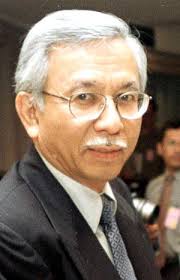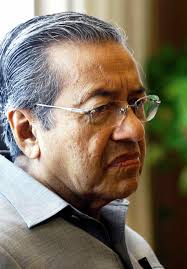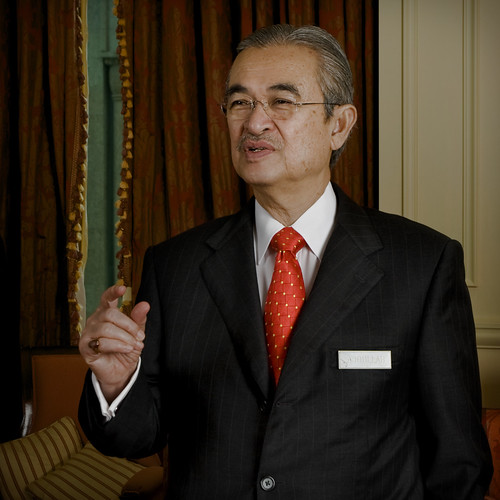



By Wong Choon Mei | suarakeAdilan
Incoming prime minister Najib Abdul Razak can be depended on to ride rough-shod over the growing swathe of legal opinion that Perak Speaker, V Sivakumar, acted within his rights to suspend BN Menteri Besar Zambry Kadir and his team of six executive councillors.
In fact, civil society leaders, rival lawmakers and even some from his own Umno-Barisan Nasional are beginning to fear that in desperation - and egged on by his mentor Mahathir Mohamad and ex-finance minister Daim Zainuddin - the 55-year old may resort to drastic measures, including emergency rule, to bulldoze his way to power.
“It would be quite impossible for Najib to back down now with the Umno party polls due next month. He would be seen to lose too much face and he doesn’t have enough political oomph yet to weather that kind of setback,” said KeADILan information chief Tian Chua.
“However, if Najib were to impose emergency rule, it would be very negative for the whole country not just Perak. But the point is, do they put the country first? For Umno, it would be disaster. They would lose all subsequent by-elections if Najib tries any strong-arm tactics.”
Said Shad Saleem Faruqi, a prominent law professor: “Emergency rule should always be the last resort. Apart from emergency rule, there are three other alternatives that may be pursued to break the constitutional deadlock in Perak, of which the first and most obvious one is to hold fresh state elections.
“The second option would be for the House to summon the assembly to session and overturn the decision of the special privileges committee. The Speaker may suspend persons on a daily basis but only the House may suspend persons on a long-term basis, in this case, for 18 months.
“Thirdly, under Article 150 (63-64), the Perak Sultan may also consult the Federal Court on the best possible course of action.”
Resurgence of extremism in Umno as Najib prepares to take over
In past Malaysians could still look to the Rulers for fair play, but after the huge Perak let-down, most believe it will be Najib - or more accurately the powers-behind-him - who will call the shots now.
Already, his close supporters have begun staking their claim to power. Former Selangor Menteri Besar Mohd Khir Toyo, alleged to have falsely accused DAP leader Teresa Kok for wanting to ban the azan or call to prayer, is now leading the charge to sack Bukit Lanjan assemblywoman Eli Wong for immoral behaviour.
Last night, Hishammudin Hussein - the Education Minister rejected by moderate Malaysians for a keris-swearing ceremony that harked at Malay racism and supremacy - called on a 5,000-strong crowd in Kuala Lumpur to defend the rights of the Rulers, in a bid to whip up Malay sentiments against rival coalition Pakatan Rakyat, which is multi-racial.
“Who says Umno Youth has no spirit and is not brave? We will show them,” said Hishamuddin. “What do we do to these traitors? We drive them out.”
But this brand of inflammatory and racist politics is sadly not new and typical of the Umno-BN, helping it to divide and rule the country for the past 51 years.
When the coalition finally lost its two-thirds parliamentary majority at the watershed March 2008 general election, many Malaysians stocked up on food supplies in anticipation of Umno-incubated riots and emergency rule.
Most Malaysians too believe that it was the kindly hand of Prime Minister Abdullah Ahmad Badawi that kept the lid on such an incident. Despite his preference for inertia, Pak Lah had worked hard to persuade his party to accept the mandate and relinquish control of four key states - Selangor, Penang, Perak and Kedah - to the Pakatan.
Perak and nation’s fate intertwined by timing of succession
Now with 39 days left to go before he submits to the early retirement enforced on him by Najib and his powerful advisers, Malaysians are starting to think twice if they really want to let him go just yet.
Even the Islamic-based PAS - not a known fan of Pak Lah’s - has suggested to Parliament to postpone the transfer of power to Najib, given the increasing political turmoil in the country.
Opposition Leader Anwar Ibrahim too is fed up with the non-stop negative politicking and the increasingly aggressive intimidation shown towards Pakatan politicians. Yesterday, he exposed in Parliament a campaign by Najib to topple the Kedah state government, using more or less the same mix of bribes and blackmail as in Perak to secure crossovers.
The scandal-plagued Najib has also disappointed in his role as Finance Minister. Only 70 percent of a RM7 billion ringgit stimulus package unveiled on Nov 4 has been disbursed to government agencies, with no sign of any trickle-down effect seen in the overall economy at all so far.
Yet the embatted DPM - who has had to fight off allegations of graft throughout his 33-year political career - is already setting his sights on launching a mini-budget estimated to be worth at least RM10 billion next month.
Fear of imprudence and lack of accountability has spurred financial analysts and civil society groups to call on Abdullah to keep a strict eye on what, where and how the funds will be used.
Whichever way the dice falls - until Abdullah’s last day in office ends on March 31 - Malaysians not just Perakians can expect the political roller coaster to intensify.
For at stake is not just the power and privilege of governing the country, but also control of the country’s coffers - which thanks to the oil boom of the past few years is quite nicely full.



















No comments:
Post a Comment